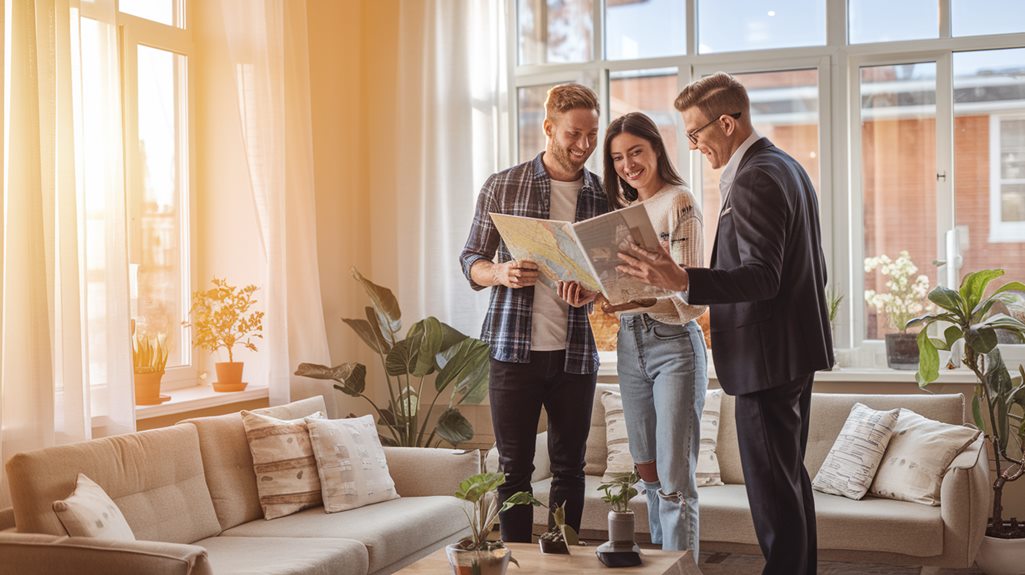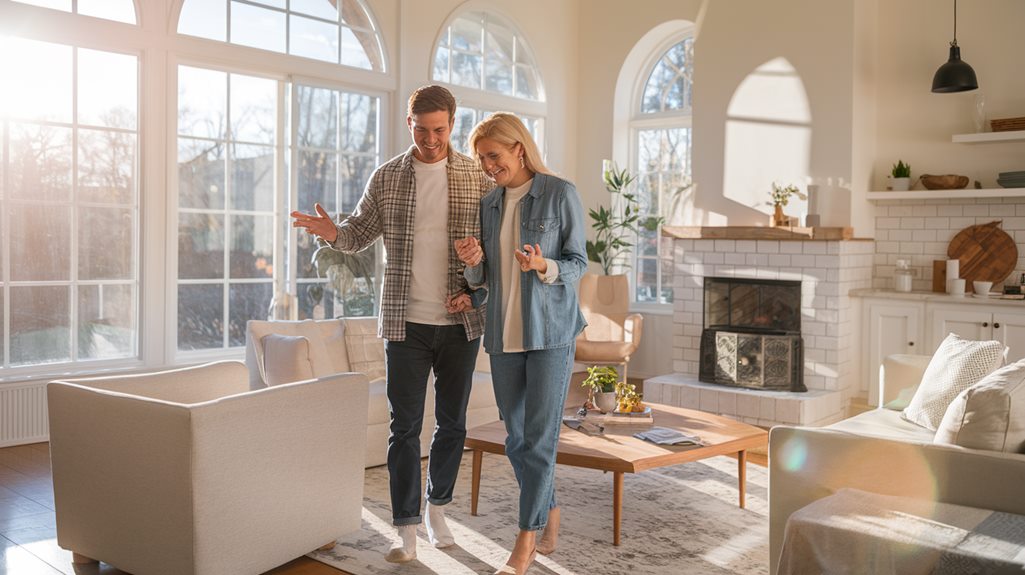If you are buying a home for the first time, here are some simple tips to help you.
First, check your money situation. This will help you see what you can afford. Getting a pre-approved mortgage is a good step. It tells you how much money you can borrow and shows sellers that you are serious about buying.
Think carefully about where you want to live. Choose a spot that fits your life now and in the future. Remember, there are extra costs like fixing things in the house and paying property taxes.
Make a list of what you really need in a home. This way, you won't worry too much about money later.
Before you buy, look closely at the house. Check for any problems that might cost you later.
Lastly, learn how to negotiate. This means talking to get the best price. Use these tips to help you make a good choice when buying your first home!
Ready to start building equity in your own Michigan home? Get your personalized home loan quote today.
Assess Your Financial Health

Checking how you're doing with money is an important first step when you want to buy a home. It helps you get ready for all the responsibilities that come with owning a house.
Start by looking at your credit score. This score is like a report card for how you handle money. A good credit score can help you get a better loan and lower interest rates, which makes it easier to buy a home.
Next, it's important to save money. Make a plan to save for an emergency fund and a down payment on your new house. Having money saved up can make a big difference when you buy a home.
By taking care of these things, you'll feel more confident and ready to make a big purchase. You can also feel proud to join other homeowners who've gone through this process.
Getting ready like this helps you feel like you belong and sets you up for a bright future.
Michigan residents, unlock the door to your new home. Request your home loan quote from Treeside Financial today.
Get Pre-Approved for a Mortgage
Getting pre-approved for a mortgage is an important step. It helps you see what loans you can get and how much money you can spend.
When you know how much you can borrow, you can look for homes that fit your budget. This way, you won't feel sad if you find a house you can't afford.
Also, having a pre-approval letter makes you a stronger buyer. Sellers will like you more because they know you can pay.
Understand Loan Options
Buying a home can feel a bit scary, but knowing your loan options can help you feel more confident. There are different types of mortgage loans, like fixed-rate and adjustable-rate loans. Each one has its own rules and interest rates. Some government loans let you pay less upfront, while private lenders might have different ways to help you refinance. Remember, your credit score is very important too!
Here's a simple chart to help you:
| Loan Type | Good Things | Things to Think About |
|---|---|---|
| Fixed Rates | Easy to plan payments | Less chance to change |
| Adjustable Rates | May start cheaper | Payments can go up later |
| Government Loans | Pay less to start | May need to meet certain rules |
| Private Lenders | Different options to refinance | Can change with each lender |
Knowing this will help you feel ready to buy your home!
Determine Budget Limits
Setting a budget is very important when you want to buy your first home. Getting pre-approved for a mortgage is a smart idea. It shows sellers you mean business and helps you know how much you can spend.
Start by saving money and keeping track of what you spend so you can afford your future mortgage.
Here are some easy steps to follow:
- Look at your monthly expenses. This helps you see how much mortgage you can pay.
- Check your savings. This tells you how much money you can use for a down payment.
- Know your credit score. It can affect the mortgage you get.
- Talk to lenders. They can help you understand how much you can borrow.
- Make a budget. Remember to include all the costs of owning a home.
Following these steps will help you buy your first home successfully!
Strengthen Negotiation Power
Once you know your budget, the next step is to get a pre-approval for a mortgage. This is an important step that helps you become a stronger buyer.
When you're pre-approved, sellers see you as serious and ready to buy. This can help you get your dream home!
In a busy market, being pre-approved shows you mean business. It helps you stand out from other buyers.
Plus, it makes sure you're looking at homes you can really afford. This saves you time and helps you avoid getting sad about homes that are too expensive.
When you understand what homes cost and show that you're prepared, you'll feel confident.
You can navigate the home buying process like a pro!
Choose the Right Location

When you pick a place to live, think about what's important to you. Do you want parks to play in? How about shops to buy things? Or maybe you need a good doctor nearby? These things can make your new home better.
Also, think about how long it takes to get to work or school. If it takes a long time, it might make your day harder.
Even if you don't have kids, check out the schools in the area. Good schools can help keep home prices up and make the neighborhood nicer.
Evaluate Neighborhood Amenities
Choosing the right place for your first home is very important.
It's not just about the house; it's also about the fun and helpful things around you.
Here are some things to think about:
- Fun places: Look for parks, museums, and places to have fun. These make life exciting!
- Helpful services: Check if there are libraries, community centers, and hospitals nearby. They can help you feel good and healthy.
- Shopping and food: It's nice to have grocery stores and yummy restaurants close by. This makes life easier!
- Schools: Good schools are important, even if you don't have kids yet. They can help if you do in the future.
- Safety: A neighborhood with low crime makes you feel safe and happy.
Think about these things to find a place where you feel at home!
Consider Commute Time
When you are looking for your first home, think about how long it will take you to get to work or school. A good commute can make your life better and help you feel more at home. Look for buses or trains nearby, and think about how traffic can slow you down. Being close to where you work and having easy ways to get there can save you time and help you feel less stressed.
Here's a simple chart to help you decide:
| What to Think About | What It Means |
|---|---|
| Public Transportation | Are there buses or trains nearby? |
| Traffic Patterns | Is it busy during rush hour? |
| Commute Time | How long will it take to travel? |
| Cost | How much will fuel or tickets cost? |
| Flexibility | Can you take different routes? |
Keep these in mind to find the best place for you!
Research School Districts
Looking at school districts is really important when you're picking a place to buy your first home.
If you have kids now or want them later, good schools can make your home worth more and help the community feel nice.
Here are some easy steps to help you check out schools:
- Visit schools: Go see the classrooms and chat with the teachers.
- Attend board meetings: Listen to what the school leaders are focusing on.
- Talk to parents: Ask them what their kids like about the schools.
- Look at activities: See what fun clubs and sports are available.
- Check online: Read what people are saying about the schools.
Finding a home in a good school district helps you feel like you belong and is a smart choice for your future!
Understand Hidden Costs
Buying a home is exciting, but it's not just about the price you pay for it. There are other costs that can surprise first-time buyers. These extra costs can add up quickly and affect how comfortable you feel in your new home and neighborhood.
When you buy a house, you have to pay closing costs. These are usually 2-5% of the house price. Closing costs cover things like appraisals, inspections, and insurance—things people often forget about.
You also need to think about maintenance costs. This means fixing things like a broken water heater or taking care of your yard. These costs help keep your home safe and nice.
If you plan for these hidden costs, you'll feel better and more sure of yourself. By preparing ahead, you can avoid surprises and really enjoy becoming a homeowner!
Prioritize Home Features

Now that you've thought about hidden costs, let's talk about what you really want in a home!
It's important to pick the things that matter most to you so that your home fits your needs and your way of life. Think about how the house is set up, how big it is, and where it's located.
Also, think about any changes you might want to make in the future. If you're buying a house for the first time, it's good to know the things you really need and the things that would just be nice to have.
Here are some ideas to help you decide:
- Number of bedrooms: Make sure there's enough space for you now and in the future.
- Kitchen size and features: Many people need a kitchen that works well for cooking and fun.
- Outdoor space: A yard or patio can be great for relaxing and having friends over.
- Close to work and schools: Living close means less time in traffic and more time for fun.
- Energy efficiency: A home that saves energy can help you save money and is good for the Earth.
Conduct Thorough Inspections
Buying a home is exciting, but you need to make sure it's safe and sound! A good home inspection is super important. It helps you check for any hidden problems that could turn your dream home into a scary place.
Use a home inspection checklist to help you look at everything, like the plumbing and electrical systems. This way, you can avoid big, surprise repairs later. It's a great idea to hire a professional inspector. They know what to look for and can find things you might miss.
Ask for recommendations to find a good inspector. This makes sure you catch any problems early. Doing a thorough inspection protects your money and helps you feel good about being a new homeowner.
When you inspect your home well, you join other smart buyers who care about safety and feeling secure. Remember, the more you know, the better choices you can make!
Negotiate Smartly

After you've looked at your new home, it's time to talk about the next important step: negotiating smartly. You want to get a good deal and feel happy with your choice.
Negotiating isn't just about how much you pay; it also includes other costs, like closing costs. Here are some easy tips to help you negotiate well:
- Think about why the seller is selling and when they want to move. This can help you make a strong offer.
- You can ask the seller to pay some of the closing costs.
- Keep an eye on what's happening in the local housing market. This can help you feel more confident.
- Be ready to walk away if the deal isn't good for you. This can help you during negotiations.
- Trust your real estate agent. They know a lot and can help you come up with good ideas.
With these tips, you'll feel like a smart homeowner!







